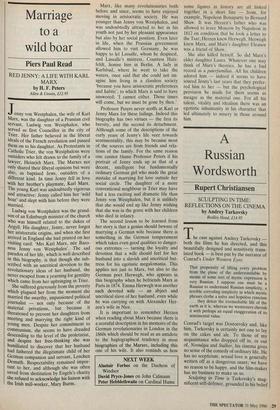Marriage to a wild boar
Piers Paul Read
RED JENNY: A LIFE WITH KARL MARX by H. F. Peters
Allen & Unwin, f12.95
Jenny von Westphalen, the wife of Karl Marx, was the daughter of a Prussian civil servant, Ludwig von Westphalen, who served as first Councillor in the city of Trier. Her father believed in the liberal ideals of the French revolution and passed them on to his daughter. As Protestants in Catholic Trier, the von Westphalens were outsiders who felt drawn to the family of a lawyer, Heinrich Marx. The Marxes not only shared their liberal opinions but were also, as baptised Jews, outsiders of a different kind. In time Jenny fell in love with her brother's playmate, Karl Marx. The young Karl was undoubtedly vigorous and attractive: Jenny called him her 'wild boar' and slept with him before they were married.
Ludwig von Westphalen was the grand- son of an Edinburgh minister of the church who was himself related to the dukes of Argyll. His daughter, Jenny, never forgot her aristocratic origins, and when she first arrived in England she had printed on her visiting card: 'Mrs Karl Marx, née Baro- ness Jenny von Westphalen'. The sad paradox of her life, which is well described in this biography, is that though she sub- scribed with an uncritical devotion to the revolutionary ideas of her husband, she never escaped from a yearning for gentility which came from her upbringing in Trier. She suffered grievously from the poverty which plagued her from the moment she married the swarthy, impassioned political Journalist — not only because of the material privations, but because it threatened to prevent her daughters from meeting and marrying the right kind of young men. Despite her commitment to communism, she seems to have dreaded descending to the level of the proletariat, and despite her free-thinking she was humiliated to discover that her husband had fathered the illegitimate child of her German companion and servant, Lenchen Demuth. Respectability remained impor- tant to her, and although she was often saved from destitution by Engels's charity she refused to acknowledge his liaison with the Irish mill-worker, Mary Burns. Marx, like many revolutionaries both before and since, seems to have enjoyed moving in aristocratic society. He was younger than Jenny von Westphalen, and was undoubtedly attracted to her in his youth not just by her pleasant appearance but also by her social position. Even later in life, when the Prussian government allowed him to visit Germany, he was happy to let Lassalle, whom he despised, and Lassalle's mistress, Countess Hatz- feldt, lionise him in Berlin. A lady in Karlsbad, where he went to take the waters, once said that she could not im- agine him living in a classless society `because you have aristocratic preferences and habits'; to which Marx is said to have answered: 'I cannot either. Those times will come, but we must be gone by then.'
Professor Peters never scoffs at Karl or Jenny Marx for These failings. Indeed this biography has two virtues — the first its brevity, and the second its detachment. Although some of the descriptions of the early years of Jenny's life veer towards sentimentality, this may be because most of the sources are from friends and rela- tions of the family. For the same reason one cannot blame Professor Peters if his portrait of Jenny ends up as that of a decent, intelligent but fundamentally ordinary German girl who made the great mistake of marrying for love outside her social circle. The daughter of a more conventional neighbour in Trier may have had a less exciting and dramatic life than Jenny von Westphalen, but it is unlikely that she would end up like Jenny wishing that she was in the grave with her children who died in infancy.
The second lesson to be learned from her story is that a genius should beware of marrying a German wife because there is something in the German temperament which takes even good qualities to danger- ous extremes — turning the loyalty and devotion that a wife should feel for her husband into a slavish and uncritical but- tress for his egotistic megalomania. This applies not just to Marx, but also to the German poet Herwegh, who appears in this biography when he befriends Marx in Paris in 1874. Emma Herwegh was another such devoted wife — an abject and uncritical slave of her husband, even while he was carrying on with Alexander Her- zen's wife in Nice.
It is important to remember Herzen when reading about Marx because there is a scornful description in his memoirs of the German revolutionaries in London in the 1860s which should be read as an antidote to the hagiographical tendency in most biographies of the Marxes, including this one of his wife. It also reminds us how some figures in history are all linked together in a short line — from, for example, Napoleon Bonaparte to Bernard Shaw. It was Herzen's father who was allowed to leave Moscow by Napoleon in 1812 on condition that he took a letter to the Tsar; Herzen knew Herwegh, Herwegh knew Marx, and Marx's daughter Eleanor was a friend of Shaw.
She also killed herself. So did Marx's elder daughter Laura. Whatever one may think of Marx's theories, he has a bad record as a paterfamilias. All his children adored him — indeed it seems to have soured Jenny's last years that they prefer- red him to her — but the psychological provision he made for them seems as meagre as the material one. For all his talent, vitality and idealism there was an egotistic inhumanity in his character that led ultimately to misery in those around him.


























































 Previous page
Previous page